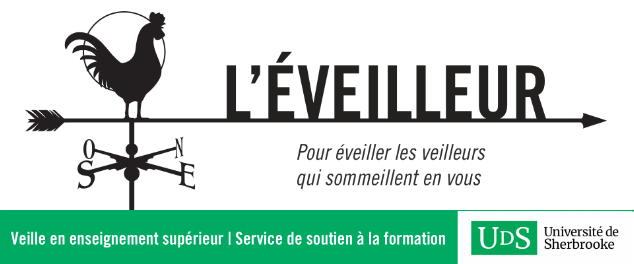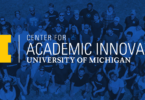The Chronicle of Higher Education rapporte que certains cours de sciences humaines offerts par la compagnie Coursera doivent composer avec le phénomène du plagiat, et ce bien que ces cours ne donnent accès à aucun crédit universitaire. En principe, les internautes inscrits à Coursera doivent s’engager à respecter un code d’honneur. [NDLR: La lecture des fondements pédagogiques derrière l’entreprise est d’ailleurs intéressante.] Les travaux étant évalués par les pairs plutôt que par le professeur (avec 39 000 étudiants, difficile de faire autrement…), des conflits émergent. Outre le fait que cette situation nous rappelle que les MOOC sont encore au stade expérimental, l’irruption du plagiat dans un contexte si particulier permet de jeter un nouveau regard sur la nature de la bête…
Dans un message adressé à ses étudiants sur un des forums du cours Fantasy and Science Fiction : The Human Mind, Our Modern World, le professeur Eric S. Rabkin de l’Université du Michigan y va d’abord d’une définition du plagiat qu’il assimile à de la fraude : « First, plagiarism, both legally and morally, is a variety of fraud. […] In a course–or any intellectual community–misrepresentation of originality is unacceptable. It strikes at the heart of mutual trust, a condition one must have in order to support the deepest, freest discourse. »
Le professeur rappelle que le plagiat est particulièrement délicat à détecter, parce que…
- (A) La plupart des gens ne citent pas de sources pour des connaissances générales (Most people don’t cite sources for common knowledge.)
- (B) De bonnes idées arrivent souvent à plus d’une personne à la fois (Good ideas often occur to more than one person at a time)
Sans enjeu d’accréditation, cette notion du plagiat comme « trahison d’une communauté intellectuelle » devient exacerbée :
« …[A] plagiarist is not truly a part of our community and should not masquerade as such, asking us to read an essay as if it were truly original and asking us to respond to an essay as if the writer truly sought genuine dialog and coaching. We all deserve better than to be subjected to fraud. We owe each other honesty and, I am happy to say, that seems to be, in the enormous majority of our interactions, just what we give. »
Toujours parce que crédits ne sont pas présents, Rabkin en appelle également à la morale intrinsèque de l’individu, à son sens de la valeur des apprentissages qu’il fait :
« If you have no idea of your own and feel you need one, you might be tempted into this fraud. Don’t do it. We all need to improve our ability to develop ideas; appropriating other people’s ideas kills that opportunity for practice, growth, and pointed response. […] But, one might say, I need even this essay to get that good grade. Do you really? This isn’t a credit-bearing course. What will you do with a good grade other than know you’ve received it? Would anyone want to believe that they had received a grade by fraud rather than by accomplishment? Aren’t we all here to enjoy the literature and grow together? »
À la fin, Rabkin rappelle que de bien citer rend un argumentaire plus solide (Citation adds to your scholarly authority; it does not diminish it.)
Dans l’article du Chronicle, on évoque aussi les différences culturelles qui ne manquent pas de survenir dans un cours d’envergure planétaire et la nécessité d’éduquer à l’intégrité.Cependant, Steven D. Krause, un professeur de la Eastern Michigan University qui suit un tel cours et enseigne la rédaction, croit que l’évaluation par les pairs sans vérification par le professeur ne peut pas fonctionner. D’après lui, c’est la part de l’enseignement supérieur traditionnel que les MOOC ne pourront jamais reproduire :
« …[Krause] doubted that peer grading could ever work without instructors’ looking at all assignments. He said he uses the technique in his writing courses at Eastern Michigan University […], but he always looks over the peer grading and checks that the students are on track. “Usually there’s some sort of norming by the instructors,” he said.
“The idea that this could scale as a broad substitute for higher education is, I think, ridiculous,” he added. “Content scales really well—you can put all kinds of stuff out on a Web site, and millions of people can look at it. But instruction does not scale, at least to those kinds of numbers.”
Coursera évoque la possibilité de soumettre les travaux à un logiciel de détection de plagiat si le phénomène se répand.
Sources :
Rabkin, Eric (mis en ligne par Kathleen Carbone), « Plagiarism », intervention sur le forum « General Discussion » du cours Fantasy and Science Fiction : The Human Mind, Our Modern World, 14 août 2012. [Il faut être inscrit à Coursera… et au cours pour avoir accès aux forums. L’inscription est gratuite.]
Young, Jeffrey R., « Dozens of Plagiarism Incidents Are Reported in Coursera’s Free Online Courses », The Chronicle of Higher Education, 16 août 2012







C’est vrai que la lecture des fondements pédagogiques derrière est fort intéressante.